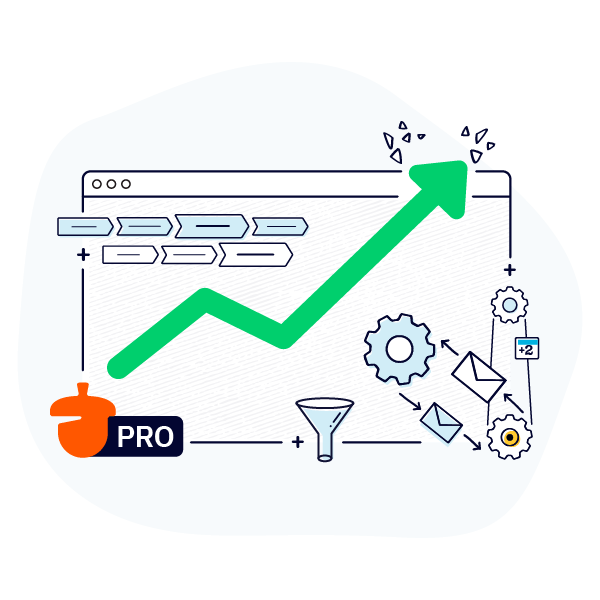
CRMs and CDPs both manage customer data, but CRMs focus on sales and relationship-building, while CDPs unify data from multiple sources for personalized marketing at scale.
But while CRMs track interactions with known contacts, CDPs collect anonymous and behavioral data to fuel targeted campaigns and automation.
The takeaway? B2B teams should use CRMs to manage pipeline and CDPs to power data-driven marketing—choosing based on whether the goal is selling or segmenting.
CRM software helps you manage your company’s relationships and interactions with prospects and current customers, while CDP software helps you track and analyze your customers’ behaviors.
Keep reading to learn more about the key differences between CRM vs. CDP software.
And don’t forget to sign up for our Sell to Win newsletter to get the latest sales and marketing advice delivered straight to your inbox!
A CRM is a platform that helps you manage your company’s interactions with leads, prospects, and current customers or clients.
It can track essential data from your audience, like their:
By tracking these details, your CRM software helps you learn more about your prospects and their interests. As a result, you can always stay connected with your audience to foster brand loyalty and deliver personalized experiences that encourage them to convert into customers.
Summarize this content with AI:
The purpose of a CRM is to improve your relationships with leads, prospects, and current customers.
A CRM platform comes equipped with various features and tools to help you track your leads in your sales funnel. This allows you to deliver the right messages at the right time to encourage them to convert.
You can also use a CRM platform to create personalized messages, like emails, that resonate with your customers’ interests. For example, you can send an email with product recommendations based on their previous purchases to increase brand loyalty and product sales.
Here are some benefits you can expect from using a CRM:
A CDP is software that creates individualized profiles of your customers and clients to detail their interactions and behaviors with your products or services. CDPs store and unify customer data in real-time and can track information like:
With a CDP, you can track your customers’ journeys and interactions on their path toward conversion.
The purpose of a CDP is to better understand the behaviors of your leads, prospects, and current customers.
It lets you gain a unified view of your customer’s journey by tracking data across multiple channels and touchpoints. You can use a CDP to view how customers first discovered your business or which content they interacted with before making a purchase.
CDPs also bring unique benefits to companies looking to gather and organize their customer data. The advantages of using a CDP include:
Although CRMs and CDPs are both used to gather and store customer data, there are several differences between how they do so. So, what is the difference between a CRM and CDP? Find out the main differences below:
The differences between CRMs and CDPs make each software better suited for different use cases. Here’s a breakdown of who should use each solution:
While CRMs can help many different departments, it’s customer-facing roles—like sales and customer service reps—most often use CRM software.
A CRM platform is mostly associated with sales teams because it tracks all the data your reps need to successfully close more deals. CRMs house all the contact details of your leads, so your sales team can easily communicate with prospects at each stage of the sales funnel to encourage them to convert into customers.
A CRM platform is also helpful for enabling your sales team to view previous interactions your leads had with other sales reps. It helps your entire team stay on the same page when delivering messages to prospects and customers.
Marketing teams also use CRMs to get a unified picture of leads and customers. Because CRMs can store how a customer interacts with marketing messages and campaigns, marketers can easily bring up a customer’s history to see what steps they should take to keep strengthening the relationship. CRM marketing analytics can tell marketers which campaigns drive the most clicks and sales, which lead contact forms receive the most submissions, and more.
No problem. To see if Nutshell is the right choice for your sales team, start a 14-day free trial today!

Non-customer-facing roles, like leadership positions, often use CDPs. That’s because CDPs give you a complete overview of your customers’ behaviors, including how they use your website and which marketing channels they interact with.
With this data, you can make decisions to optimize your product and improve marketing strategies to drive more sales and revenue for your company in the future.
Trying to decide between a CRM or CDP? Many businesses use both to maximize their sales and revenue.
But if you want to cut down on your software costs or solve a specific problem for your team, you might want to opt for one platform over the other.
You should choose a CRM platform if you want to:
DOWNLOAD
Download our free guide to understanding the benefits of a CRM.

You should opt for CDP software if you want to:
Looking for your all-in-one customer data and sales-driving solution? Say hello to Nutshell.
Our powerful CRM software helps you automate sales processes, build strong relationships with prospects and customers, and close more deals for your business.
If you’re ready to track and analyze valuable data about your customers, Nutshell is ready to help. Our friendly team is always available to provide world-class one-on-one support to help you maximize your sales with every feature our CRM offers.
Contact us to learn more about how our CRM can grow your business, or get started with your free trial to test it out for yourself!
Photo by Alexander Sinn on Unsplash
Yes, many businesses use both systems together for maximum impact. The CDP collects and unifies customer data from all touchpoints, then feeds enriched insights into your CRM. This gives sales teams real-time behavioral data alongside relationship history, enabling smarter outreach and personalized engagement at the right moment.
Most small B2B businesses should start with a CRM. It’s more affordable and directly supports your sales team’s daily work—managing contacts, tracking deals, and closing sales. Add a CDP later when you need advanced marketing automation, multi-channel data unification, or sophisticated customer segmentation across complex buyer journeys.
No, they serve different purposes. A CRM manages direct customer relationships and sales processes, while a CDP unifies behavioral data from multiple sources for marketing insights. Think of it this way: CRMs help you sell to known contacts, while CDPs help you understand anonymous visitors and customer behavior patterns.
Nutshell is a CRM that includes robust marketing automation and analytics features. While we don’t offer full CDP capabilities, Nutshell tracks customer interactions, marketing engagement, and sales activities in one place. This gives B2B teams the unified customer view they need without the complexity and cost of enterprise CDP systems.
Consider adding a CDP when you’re tracking customers across multiple digital channels (website, app, social media), need real-time behavioral triggers for marketing campaigns, or want to unify anonymous and known customer data. If your CRM handles your current needs and your sales cycle is straightforward, stick with it.


Join 30,000+ other sales and marketing professionals. Subscribe to our Sell to Win newsletter!